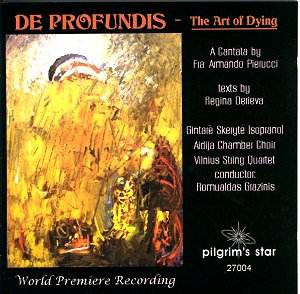This
is a very unusual disc - the composer is an Italian priest resident
in the Holy Land, the texts of the main work are in Russian by
a Catholic Russian poet who emigrated to Israel but now lives
in Sweden, and it was recorded in Lithuania by artists from that
Baltic nation. Despite all this there is very much a real musical
identity to what goes on here - the recording is fairly rough
and ready, almost unlistenably so in the case of the solo organ
pieces, but most of the time the music goes well beyond these
confines.
The
cantata De Profundis, subtitled rather gloomily The
Art of Dying, is conceived for chamber forces and as such
has a lightness of tone rarely heard in works of this ilk. The
music is neo-classical in style, although I can almost hear Finzi,
admittedly at his most Bachian, in the slower sections, with flourishes
that may fleetingly remind you of the French religious masterpieces
of Fauré, Duruflé etc. The poems used for the text
are religious, serious and often rather tragic in nature. A glance
at some of the titles will show this - "There are disgusting things,
which are impossible to countů" and "The fewer former things"
- with subject matter relating indirectly to "the new tragedy
of the Palestinian people, amongst which both the poet and the
composer have lived for about ten years". No doubt this sort of
thing would go down like a lead balloon with the Israeli right
wing - no wonder Regina Derieva wasn't granted citizenship there.
This music, pleasant and well written though it is, does not match
the serious intent of the texts and, though very listenable, tends
to water down the message intended. It nevertheless remains an
interesting listen.
The
remaining pieces are solo organ works, recorded earlier, actually
in the Holy Land, with the composer playing. The Alleluia Variations
are beautiful, almost folklike, if an organ can be! I was less
enamoured with the "Via Crucis" Variations which are based
on a theme from Pierucci's previous collaboration with Derieva.
The recorded sound is appalling but the first set of variations
transcends this because of the quality of the inspiration at work.
It is important that this sort of project is released and people
are given an opportunity to hear it. It is unlikely to top any
charts or win any awards but it speaks of emotions, events and
situations unfortunately far more real than the glitz and glam
of the mainstream. The performers do the music and its composer
full justice and the whole enterprise shines out like a beacon
of integrity in the midst of compilation and crossover driven
blandout.
Neil
Horner
